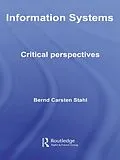Whilst Information Systems has the potential to widen our view of the world, it often has the opposite effect by limiting our ability to interact, facilitating managerial and state surveillance or instituting strict hierarchies and personal control. In this book, Bernd Stahl offers an alternative and critical perspective on the subject, arguing tha
Autorentext
Bernd Stahl is a Reader in Critical Research in Technology in the Centre for Computing and Social Responsibility at De Montford University in Leicester.
Inhalt
Table of Contents Introduction Section 1: Theory Critical Research in Information Systems Theoretical Discourses: A Comparison of the Foucauldian and Habermasian Concepts of Discourse in CRIS Ethics, Morality and Critical Research in IS, Emancipation Across Cultural Boundaries: A Fundamental Problem of Critical Research in Information Systems Section 2: Philosophy Ontology: On Positivism, Realism, and their Relevance for Critical IS Research Epistemology: On Information, Knowledge and Truth, Methodology: Is there a Specific Critical Way to Knowledge? Philosophical Syncretism in IS Research: Final Remarks on Ontology, Epistemology and Paradigms Section 3: Application Information Systems as Means of (Dis)Empowerment: The Information Society and Decision Support Systems in Local Authorities in Egypt Responsible and Heroic Management of Workplace Privacy: A Critical View of ICT Management Trust as Fetish: A Critical Theory Perspective on Research on Trust in E-Commerce The Ideological Use of Privacy and Security The Metaphor of Evolution in E-Commerce: A Critical Evaluation Commercial Colonization: E-Teaching and E-Democracy Section 4: Reflection(s) Limitations of the Critical Approach, The Future of Critical Research in Information Systems
